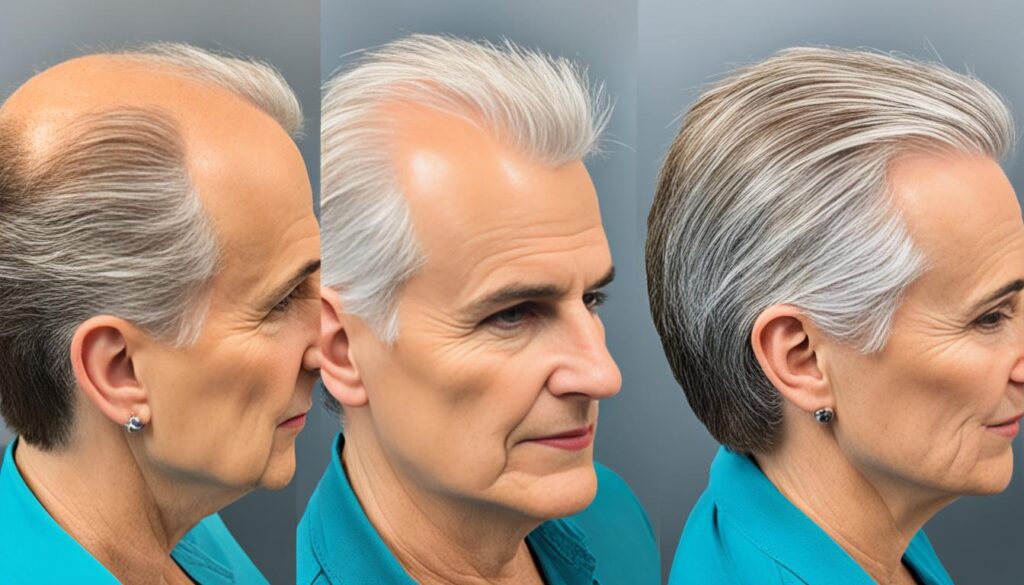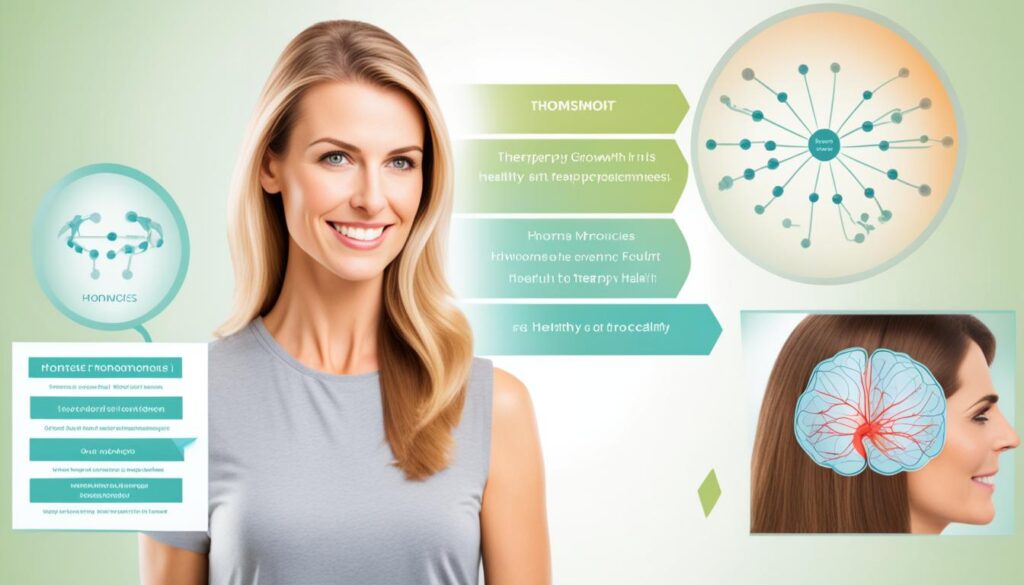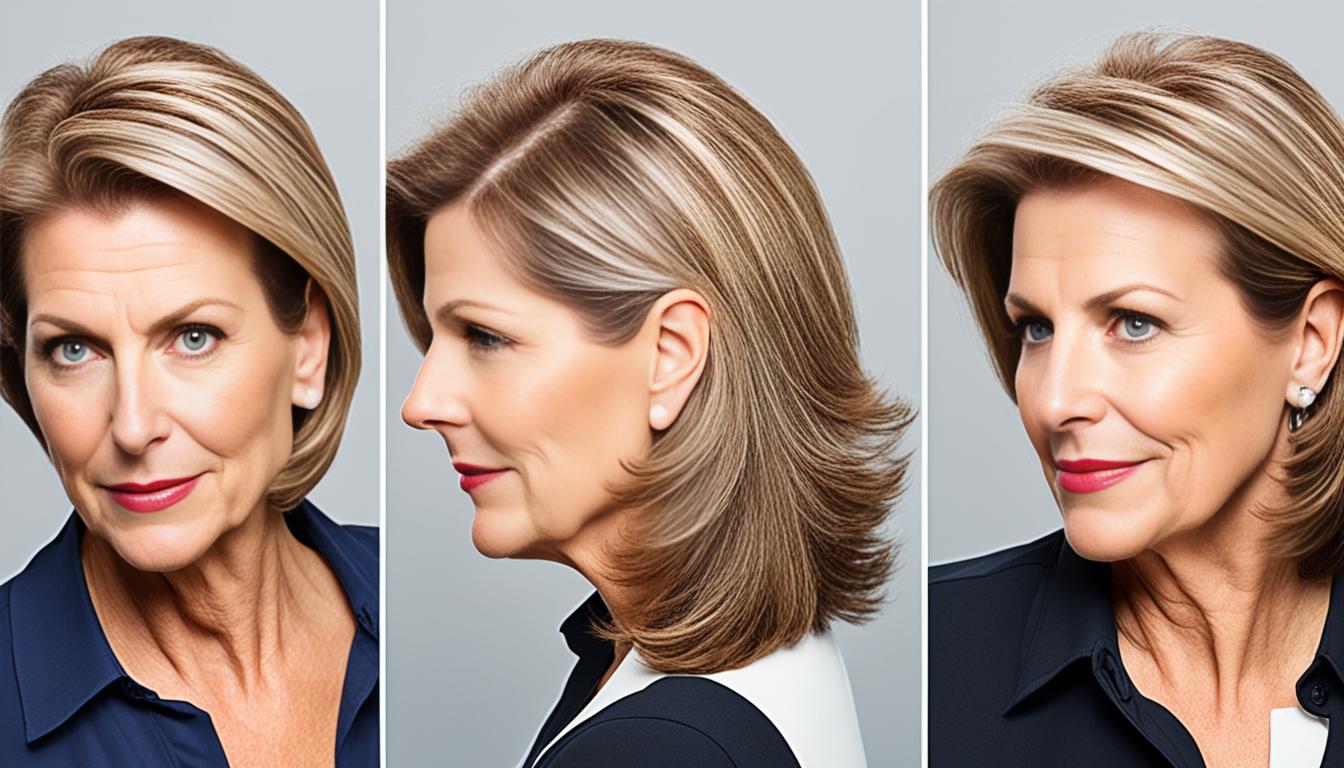Hormone Replacement Therapy (HRT) can have a significant impact on hair growth and hair loss, particularly for menopausal women. While there have been few studies on the direct connection between hormones and hair, HRT has been found to be helpful in treating hormonal imbalances that can lead to hair loss. Hormones such as estrogen and progesterone play a crucial role in promoting healthy hair growth, and their decline during menopause can contribute to hair loss. HRT can help address these hormonal imbalances and promote hair regrowth in women undergoing natural menopause or gender affirmation procedures.
Key Takeaways:
- Hormone Replacement Therapy (HRT) can help treat hair loss caused by hormonal imbalances.
- Estrogen and progesterone are essential hormones for promoting healthy hair growth.
- HRT can address hormonal imbalances and promote hair regrowth during menopause.
- HRT may have potential benefits for both natural menopausal women and those undergoing gender affirmation procedures.
- Individuals considering HRT should consult with their healthcare provider to discuss potential risks and benefits.
Does HRT Cause Hair Loss?
While hormone replacement therapy (HRT) can be a beneficial treatment for addressing hormonal imbalances that contribute to hair loss, it’s important to note that certain forms of HRT may actually accelerate hair loss in some cases.
Specifically, treatments that contain testosterone, such as medications used to treat libido issues, can lead to a type of hair loss known as androgenic alopecia. Androgenic alopecia is a common form of hair loss that occurs due to a combination of genetic factors and the influence of androgen hormones, including testosterone.
Individuals considering HRT should have a thorough discussion with their doctor about the potential risks and benefits. It’s essential to understand the specific medications and treatment protocols involved in the HRT plan and their potential impact on hair loss.
“While HRT can be beneficial for addressing hormonal imbalances that contribute to hair loss, it is important to note that certain treatments, specifically those containing testosterone, can actually accelerate hair loss in some cases.”
To determine the risk of hair loss with HRT, it’s crucial to consider factors such as the individual’s specific hormone levels, underlying health conditions, and genetic predisposition for androgenic alopecia. A comprehensive evaluation by a medical professional can help assess the potential impact of HRT on hair loss and guide treatment decisions.
Ultimately, the decision to pursue HRT for hair loss should be made in consultation with a qualified healthcare provider who can thoroughly evaluate the individual’s medical history, current health status, and goals for treatment.
| Pros | Cons |
|---|---|
| – Addresses hormonal imbalances | – Certain treatments may accelerate hair loss |
| – Can promote hair regrowth | – Potential risks and side effects |
| – Hormone therapy benefits overall well-being | – Individual factors may impact treatment efficacy |
It’s important to remember that HRT is not the only solution for hair loss. There are alternative treatments, lifestyle changes, and hair care practices that can also support hair health and minimize hair loss. A comprehensive approach, including a balanced diet, stress management, and proper hair care, may provide additional benefits when combined with HRT for hair loss.
Consultation with a Healthcare Professional
If you’re considering hormone replacement therapy for hair loss, it’s essential to consult with a qualified healthcare professional who specializes in hormone therapy and hair loss treatments. They can provide personalized recommendations based on your specific circumstances and help you make informed decisions.

How Does Hormone Therapy Help Hair Loss?
Hormone therapy, specifically Hormone Replacement Therapy (HRT), can be an effective solution for addressing hair loss caused by hormonal imbalances. As women age and undergo menopause, their bodies naturally produce lower levels of estrogen and progesterone, which are essential hormones for promoting healthy hair growth. This decline in hormone levels can result in hair thinning and loss.
By undergoing hormone therapy, individuals can maintain optimal levels of estrogen and progesterone, helping to stimulate hair regrowth and prevent further hair loss. HRT works by supplementing the body with these hormones, compensating for the deficiencies that often occur during menopause.
Why is hormone therapy beneficial for hair growth?
- Hormone therapy restores hormonal balance in the body, ensuring the necessary levels of estrogen and progesterone for promoting healthy hair growth.
- By replenishing estrogen and progesterone, hormone therapy addresses the underlying causes of hair loss due to hormonal imbalances.
- Increased hormone levels help nourish and strengthen hair follicles, leading to improved hair density and thickness.
- Hormone therapy can be particularly effective for individuals whose hair loss is directly linked to hormone deficiencies.
However, it’s important to note that hormone therapy may not be suitable for everyone. It is crucial to consult with a qualified healthcare provider to determine the appropriate treatment plan based on individual circumstances and overall health.
Scientific evidence supporting the use of hormone therapy for hair loss:
While there have been limited studies specifically examining the relationship between hormone therapy and hair growth, numerous research studies have demonstrated the vital role that hormones play in promoting healthy hair follicle function. Estrogen and progesterone have been found to contribute to hair growth, and their decline during menopause can result in hair loss. By restoring the body’s hormone levels through hormone therapy, individuals can potentially reverse the effects of hair loss associated with hormonal imbalances.
It’s important to discuss the potential benefits and risks of hormone therapy with a healthcare provider before initiating treatment. A thorough evaluation of one’s medical history, current health status, and individual needs will help determine if hormone therapy is an appropriate option for addressing hair loss.

| Hormone Therapy for Hair Loss | Benefits | Risks |
|---|---|---|
| Restores hormonal balance | Promotes hair regrowth | Potential side effects and risks associated with hormone therapy, such as increased risk of breast cancer, heart disease, stroke, and blood clots. |
| Addresses hormonal imbalances | Strengthens hair follicles | Increased risk of uterine cancer in women with intact uteruses |
| Improves hair density and thickness | ||
| Effective treatment for hormone-related hair loss |
Benefits and Risks of HRT
When considering Hormone Replacement Therapy (HRT) to address hormonal imbalances and hair loss, it is important to weigh the potential benefits against the risks. While HRT can be beneficial in treating hormonal imbalances that contribute to hair loss, there are potential risks that individuals need to be aware of.
Prolonged use of HRT has been associated with an increased risk of certain health conditions, including:
- Breast cancer: Studies have shown that long-term estrogen-progestin hormone therapy can slightly increase the risk of breast cancer.
- Heart disease: There is evidence suggesting that HRT may increase the risk of heart disease in certain women.
- Blood clots: Some studies have linked HRT use to an increased risk of blood clots, including deep vein thrombosis and pulmonary embolism.
Women with intact uteruses may also be at risk for uterine cancer due to the use of estrogen-alone therapy without progesterone.
It is crucial for individuals considering HRT to have a thorough discussion with their healthcare provider about the potential risks based on their medical history and individual circumstances. By understanding and weighing these risks against the benefits, individuals can make an informed decision about whether HRT is the right choice for them in terms of addressing hormonal imbalances and managing hair loss.
Table: Benefits and Risks of Hormone Replacement Therapy
| Benefits | Risks |
|---|---|
| – Treatment of hormonal imbalances | – Increased risk of breast cancer |
| – Potential hair regrowth | – Higher risk of heart disease |
| – Increased risk of blood clots | |
| – Risk of uterine cancer |
It is important to note that these risks may vary depending on individual factors such as age, medical history, and existing health conditions. Close monitoring and regular consultations with a healthcare provider are crucial for managing the potential risks associated with HRT.
Patches, Pills, and Creams
For women experiencing post-menopausal hair loss, hormone therapy can be administered in various forms, including transdermal patches, pills, creams, and gels. These methods allow for the delivery of estrogen and progesterone to the body, helping to address hormonal imbalances that contribute to hair loss.
The dosage and formulation of hormone therapy can vary, and it is typically prescribed at the lowest effective dose. It is essential to check insurance coverage for hormone therapy, as not all plans may cover it.
Comparison of Hormone Therapy Administration Methods
| Administration Method | Benefits | Drawbacks |
|---|---|---|
| Transdermal Patches | – Convenient and easy to use – Provides a steady release of hormones – Avoids first-pass metabolism |
– May cause skin irritation – Can be expensive – Requires regular patch changes |
| Pills | – Widely available and accessible – Can be taken orally – Offers flexible dosing options |
– May have side effects such as nausea or bloating – Can interact with other medications – May have a higher risk of blood clots |
| Creams and Gels | – Easy to apply topically – Allows for localized hormone delivery – May provide relief for vaginal dryness |
– Can transfer to others through skin contact – May cause skin irritation or rash – Requires consistent application |
Discuss with your healthcare provider to determine the most suitable administration method for your specific needs and consult them regularly to monitor the effectiveness of the hormone therapy.
Tips to Prevent Hair Loss
While hormone therapy can help address hair loss caused by hormonal imbalances during menopause, there are additional measures you can take to minimize hair loss and promote hair health. Incorporating these tips into your routine can have a positive impact on maintaining a healthy head of hair.
1. Exercise Regularly
Regular exercise not only benefits your overall health but also improves circulation, including blood flow to the scalp. This increased blood flow delivers essential nutrients and oxygen to your hair follicles, promoting healthy hair growth. Additionally, exercise helps reduce stress, which can contribute to hair loss. Aim for at least 30 minutes of moderate-intensity exercise most days of the week, such as brisk walking, cycling, or swimming.
2. Stay Hydrated
Proper hydration is crucial for maintaining healthy hair. When your body is dehydrated, your hair can become weak, brittle, and prone to breakage. Make it a habit to drink an adequate amount of water each day, aiming for at least eight 8-ounce glasses. Stay hydrated not only by drinking water but also by consuming hydrating foods, such as fruits and vegetables with high water content.
3. Manage Stress
Stress can contribute to hair loss, so finding effective ways to manage stress is essential. Engage in stress-reducing activities such as meditation, deep breathing exercises, yoga, or engaging in hobbies you enjoy. Prioritize self-care and make time for activities that help you relax and unwind. Taking care of your mental and emotional well-being can have a positive impact on your hair health.
4. Follow a Well-Balanced Diet
A well-balanced diet rich in essential nutrients can promote healthy hair growth and prevent hair loss. Include a variety of nutrient-dense foods in your meals, such as fruits, vegetables, whole grains, lean proteins, and healthy fats. Ensure you’re getting an adequate intake of vitamins, minerals, and antioxidants through your diet to support optimal hair health.
5. Consider Supplements
In addition to a well-balanced diet, certain supplements may help promote hair growth and prevent hair loss. Consult with your healthcare provider to determine if supplements are appropriate for you. Some supplements that may be beneficial for hair health include biotin, vitamin D, iron, zinc, and omega-3 fatty acids. It’s important to note that supplements should complement a healthy diet and not replace it.
Conclusion
Hormone replacement therapy (HRT) is a valuable treatment option for women experiencing menopausal hair loss. By addressing hormonal imbalances, HRT helps to maintain the ideal levels of hormones such as estrogen and progesterone, which are essential for healthy hair growth. The therapy can effectively promote hair regrowth and prevent further hair thinning.
While it is important to consider the potential risks associated with HRT, such as an increased risk of breast cancer, heart disease, stroke, and blood clots, the benefits of hormone therapy in addressing hair loss outweigh the side effects for many women. It is crucial for individuals to have an open discussion with their healthcare provider to understand the potential risks and benefits specific to their circumstances.
In addition to hormone therapy, implementing certain lifestyle changes can further support hair health during menopause. Regular exercise improves circulation and reduces stress, both of which can positively impact hair density and growth. Staying adequately hydrated, managing stress levels, maintaining a well-balanced diet, and considering the use of supplements can also contribute to overall hair health.
Overall, hormone replacement therapy, combined with lifestyle modifications, provides a comprehensive approach to combat menopausal hair loss. Consulting with a healthcare professional and exploring suitable treatment options tailored to individual needs is crucial in achieving the best possible outcomes for hair density and growth during this stage of life.
FAQ
What are the benefits of hormone replacement therapy for hair?
Hormone replacement therapy (HRT) can have a significant impact on hair growth and hair loss. It can help address hormonal imbalances that contribute to hair loss, particularly for menopausal women and individuals undergoing gender affirmation procedures. By maintaining optimal levels of hormones like estrogen and progesterone, HRT can promote hair regrowth and restore hair density.
Does hormone replacement therapy (HRT) cause hair loss?
While HRT can be beneficial for addressing hormonal imbalances that contribute to hair loss, certain treatments containing testosterone can actually accelerate hair loss in some cases. Medications used to treat libido issues can cause androgenic alopecia, a type of hair loss. It is essential to discuss the potential risks and benefits of HRT with a healthcare provider before starting treatment.
How does hormone therapy help with hair loss?
Hormone therapy, particularly HRT, helps address hair loss caused by hormonal imbalances. As women age and undergo menopause, their bodies produce less estrogen and progesterone, which are essential hormones for promoting healthy hair growth. HRT helps maintain the levels of these hormones and promotes hair regrowth. It is most effective when hair loss is directly related to hormone deficiencies.
What are the benefits and risks of hormone replacement therapy (HRT)?
HRT can be beneficial for treating hormonal imbalances that contribute to hair loss. However, it is important to consider the potential risks. Prolonged use of HRT has been associated with a higher risk of breast cancer, heart disease, stroke, and blood clots. Women with intact uteruses may also be at risk for uterine cancer. It is crucial to discuss these potential side effects with a healthcare provider and weigh the benefits against the risks, particularly if there is a history of heart disease, blood clots, or cancer.
What are the different forms of hormone therapy for hair loss?
For women experiencing post-menopausal hair loss, hormone therapy can be administered in various forms, including transdermal patches, pills, creams, and gels. These methods allow for the delivery of estrogen and progesterone to the body, helping address hormonal imbalances that contribute to hair loss. The dosage and formulation of hormone therapy can vary, and it is typically prescribed at the lowest effective dose. It is important to check insurance coverage for hormone therapy, as not all plans may cover it.
Are there any tips to prevent hair loss during menopause?
While hormone therapy can help address hair loss caused by hormonal imbalances, there are other measures individuals going through menopause can take to minimize hair loss and promote hair health. Regular exercise can improve circulation and reduce stress, both of which can have a positive impact on hair health. Staying properly hydrated is also important for maintaining healthy hair. A well-balanced diet and the addition of supplements can provide the necessary nutrients for hair growth. It is crucial to consult with a healthcare provider to determine the right approach for hair loss prevention during menopause.
What is the impact of hormone replacement therapy on hair density and growth?
Hormone replacement therapy, particularly for women experiencing menopausal hair loss, can offer significant benefits in promoting hair regrowth and preventing further hair thinning. By addressing hormonal imbalances, hormone therapy helps maintain ideal hormone levels, including estrogen and progesterone, which play a crucial role in hair health. With the appropriate hormone levels, individuals may experience improved hair density and growth.

